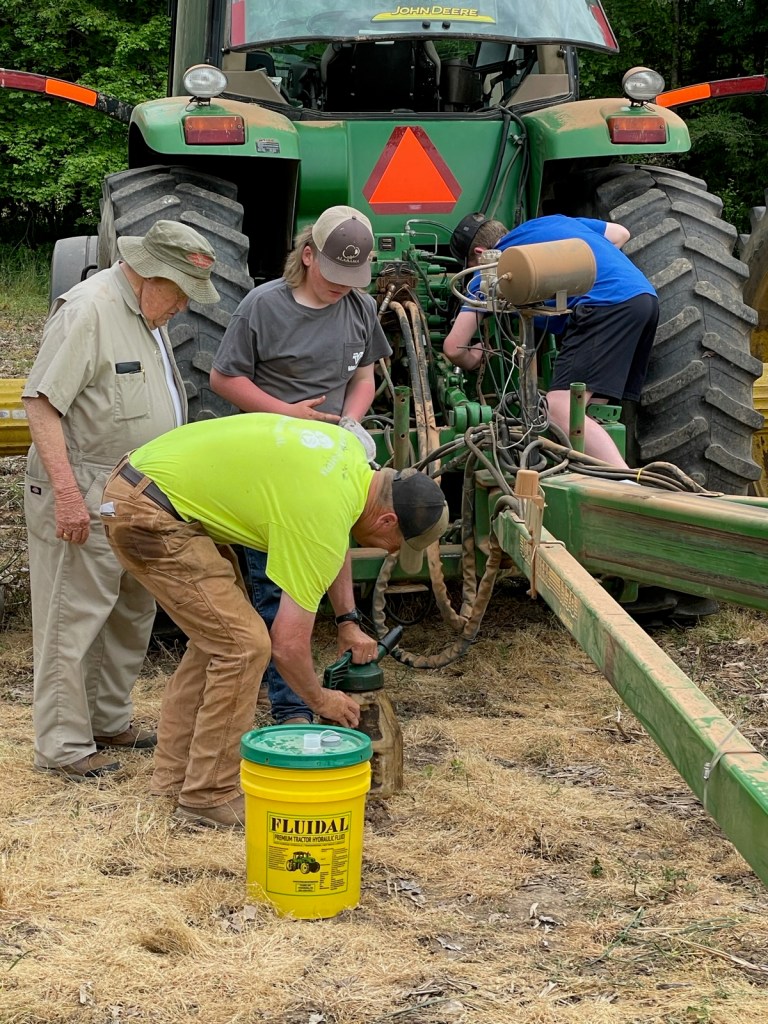THANK A FARMER: Hobbs Farms helps put food on the table
Published 1:00 pm Thursday, May 20, 2021

- Helping out around Hobbs Farms is a family affair.
“A country that can feed itself can survive.”
That bit of wisdom heard years ago has stuck with Jessie Hobbs III ever since, and now, as a farmer in Elkmont, he and his family at Hobbs Farms are helping to put food on the table for people in Limestone County and beyond.
Hobbs is the fifth generation of his family to take up the farming profession. What started as a small family farm run by his great-great-grandfather now encompasses 3,500 acres, from Pulaski, Tennessee, down to Athens.
“I’ve been farming my whole life,” Hobbs said. “I’ve been doing it full time since I came back home from college in 1998. My granddad always told me I’d be the fifth generation up in these hills. He told me, ‘If you ever get dirt under your fingernails, you’ll never get it out.’”
Hobbs said the farm grows mostly row crops, like corn, wheat, cotton and beans. He said they have added some other crops, like canola, sesame and even some barley grown for local microbreweries.
“We have a diversified farm,” he said. “We never follow the same crop; we rotate all the ground. I am never scared to try new things. My dad, who is 79, gets on to me for experimenting, but if you don’t do that with 10–15% of your land, you’re falling behind.”
Hobbs Farms also grows about 5,000 pumpkins each year for an annual pumpkin patch and fall decorations, as well as some sunflowers.
“There’s always something to do around this place,” Hobbs said. “Everyone wears different hats. I run the day-to-day operations. We have three full-time employees. My dad is my best friend and my bookkeeper. We pick up some seasonal help as we go along, and we have a great group of guys.”
Growing up
As the fifth generation running Hobbs Farms, farming is in Hobbs’ blood. Like many farmers, he was started on the path from an early age.
“I rode many fenders and knees on tractors,” he said. “My first solo voyage running the tractor was by my house. It was my fifth birthday, and my grandmother pulled up with a cake while my dad was grilling hamburgers. Once she realized I was on the tractor, she started chewing (my dad) out.”
Hobbs said he helped out on the family farm all through high school, but he said his mom’s deal was he could not join in a full-time, official capacity without first earning a college degree.
Which Hobbs did, graduating from Auburn University in 1998.
“When I came home with my paper, Mom allowed me to join the farm,” Hobbs said.
Fast forward to today, and Hobbs’ twin 15-year-old sons, Curtis and Corder, help out around the family farm. Hobbs says if they choose to stick with it, they will be the “sixth generation to beat this rock up here.”
“They are pretty decent athletes, and they are definitely helping out,” Hobbs said. “They are floaters — they do whatever they need to. Both of them say they want to join the family business, and I hope and pray the opportunity is there.”
Hobbs said farming is a rewarding but risky occupation.
“Farming is not always happy times and smiles,” he said. “To know you did everything in your power to grow something, but you missed one rain or the market failed, it can all be swept right out from under your feet. They both have a love of farming, but they have a lot of stuff to learn. When their buddies are home watching cartoons, they are out working.”
Grow time
Though different crops require different amounts of time to grow and harvest, Hobbs said the farm’s season lasts from early February through Christmas.
“When we start planting, we’re all in,” he said. “I get excited about planting. I think the anticipation and excitement of early springtime is my favorite part of the year. You plant a seed in the ground, nurture it and, with everything in your power and some help from the good Lord above, you will get to feed your families and others.”
Hobbs said knowing he is helping to feed his family, his neighbors and “the world” gives him purpose.
“I know, because I did my part, someone else got to eat tonight,” he said. “I’m very fortunate and proud to be able to do what I love. They say if you do what you love, you’ll never work a day in your life, and I’ve never worked a day in my life.”
Hobbs said right now the farm is working on getting combines out of the shed, washed and the oil changed while transitioning from large grains to small grains like wheat and barley.
“We are getting the irrigation pumps out of the shed,” he said. “We just finished putting herbicide in the corn. Our next trip is in the cotton field. We like to rotate crop, but I like to rotate genetics as well pest control and herbicide. Each crop stands alone.”
Hobbs said many people have no clue what farmers do these days, and not many people are able to start farms from scratch because of the associated “substantial” financial burden on top of finding not just land, but productive ground.
“No farmers want to be applauded. They would just like people to know what they do and appreciate them,” he said.
Cutting edge
The basics of farming may not have changed in millennia, but the methods used in the occupation these days are filled with modern technology and new advancements.
Hobbs said farmers these days are on the edge of their seats, seeing what is coming next.
“Three people can do the work of 12 now and do just as good a job, if not better,” he said. “We can label each cotton bale with where it came from in the field and how much product and fertilizer went into it. We can get so much data now; it’s definitely exciting.”
Hobbs said technology has led to a huge increase in precision, with many farmers these days saying efficiency is one of the biggest factors in maintaining a profitable business.
“We used to go farm by farm, but now we go acre by acre in our planning,” he said. “We can grid, and we know which crop works best in which area. We know exactly how many pounds of product it takes to make a bushel, how many pounds of fertilizer it takes to make 100 pounds of cotton. We have a more precision state of mind now, and if you get on a sprayer now without those modern capabilities, you are lost.”
Hobbs said he is “tickled and proud” to say he is a farmer and to show just how far the profession has advanced these days. In order to keep things advancing, the only way to move is forward.
“No matter where you are in life, you need to make the best of it,” he said. “When in doubt, look higher. Always want more, especially for your kids.”
— Thank A Farmer is part of an ongoing series by The News Courier in an attempt to highlight the hard work and dedication of local growers. If you ate today, thank a farmer. If you know a farmer that should be included in the series, let us know by emailing jr@athensnews-courier.com.





